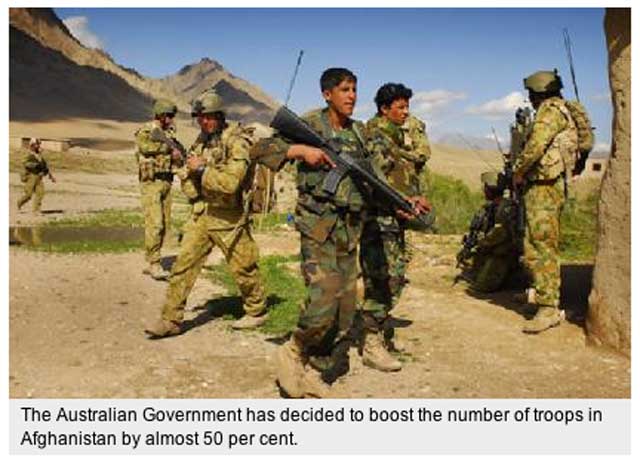
More troops, more deaths, PM says
Brendan Nicholson
April 30, 2009

THE Rudd Government has for the first time outlined an "exit strategy" for the withdrawal of Australian troops from Afghanistan, while announcing a big increase in its military commitment to the war against the Taliban and al-Qaeda.
This was followed late last night by Britain, which said it would send an extra 700 troops to the war-torn country to provide security during August elections.
And it emerged that US commanders planned to send thousands of troops to destroy the opium crops that bring the Taliban an estimated $300 million a year, bankrolling their operations.
Prime Minister Kevin Rudd said an extra 450 troops would be sent to help train the Afghan army so that it could take responsibility for national security in the face of the increasing threat from extremists.
"This commitment … is not a blank cheque but is focused on training the Afghans to manage their own security, thereby allowing Australia to bring our military combat operations to a close," Mr Rudd said.
"The successful training of the Afghan National Army over time is our exit strategy for Australia's combat units."
But Mr Rudd made it clear that it would be a long and dangerous process, and would cost more Australian lives.
The increase takes to 1550 the number of Australian troops in Afghanistan, where 10 Australians have been killed since 2001, making it the nation's most deadly military engagement since Vietnam.
British Prime Minister Gordon Brown said the extra forces — taking its commitment to 9000 — would be removed in November, restoring numbers to current levels.
Australia's troop increase follows a request for "practical support" from US President Barack Obama and criticism from NATO officials that Australia, while a vocal critic of the effort of European nations, was doing no more itself.
Many of the fresh Australian troops will be embedded with a 3300-strong Afghan National Army brigade intended ultimately to take over responsibility for security in Oruzgan Province, where the main Australian force is based.
Mr Rudd said that training a whole brigade in Oruzgan province was a large task, "but that is now explicitly the benchmark".
Defence analyst Professor Hugh White, of the Australian National University, said he did not think the increased Australian numbers would make much difference. He told Lateline it was more a case of demonstrating loyalty to the US than a serious attempt to win the war.
"We're kind of kidding ourselves if we think all we need to do to get out of Afghanistan with honour intact is to train this brigade and head for the door. It's a bit of a fantasy," he said. "I think this effort is doomed to failure."
An additional infantry company of 120 men will be sent to help during the Afghan elections, along with a small team of civilian election monitors.
The soldiers will be joined by a team of 10 Australian Federal Police to help train the struggling Afghan police service.
The Australian and British announcements came as a Taliban commander threatened a new campaign of suicide bombings in response to an imminent surge of 21,000 US troops under a sweeping new strategy rolled out by the Obama Administration to stabilise the country, and amid widespread acknowledgement the eight-year-old war is being lost.
The Opposition strongly supported the new deployments.
But retired Australian Army Major-General Jim Molan, who was chief of operations with US forces in Iraq, said that while the troop commitment would help, it was not enough.
Major-General Molan said the Government should be commended because it could have done nothing, and that Mr Rudd had not ruled out further deployments.
"I think they will be inevitable," he said. "He has still not addressed the basic problem of having sufficient troops on the ground."
Major-General Molan said it would remain almost impossible to establish security in Oruzgan Province with much fewer than 6000 effective troops.
"We have roughly 3000 there now and we're losing," he said.
Most of them were Dutch troops and next year half of them would probably go home.
He said the new Afghan brigade would not be fully effective for about three years, and there was no indication that US troops would be sent to the province. "The figures don't add up."
The soldiers in the Operational Mentor and Liaison Teams, dubbed "omlettes", fill one of the most valuable and dangerous roles in Afghanistan. The instructors are "embedded" with Afghan army units, often in small stone forts in territory the Taliban wants to control.
Late last month one of the mentors, Corporal Mathew Hopkins, was killed by the Taliban in the Chora Valley. In a separate incident, three other Australian instructors and an Afghan interpreter were seriously wounded in a Taliban ambush while patrolling on foot with the Afghan army.
Yesterday, nearly two dozen militants were killed in Oruzgan after ambushing a US-led patrol of coalition troops and police.